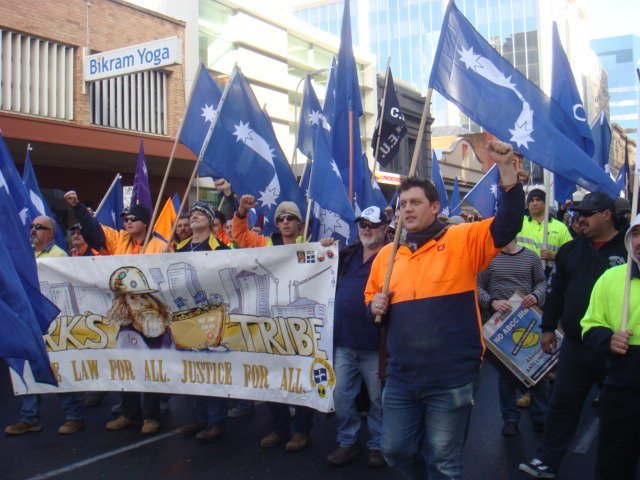
Last month, thousands of people around the country marched in solidarity with Ark Tribe, the construction worker from Adelaide who faces six months’ jail for refusing to attend an interview with the Australian Building and Construction Commission (ABCC).
Adorned with emblems of union pride, rank and file union members, representatives from unions, political parties and the broader community, took to the streets to send a clear message to the government and the big construction bosses that “If Ark goes in, we'll go out''.
But why has this one individual case caused so much outrage? And what does this case mean for young workers and their rights?
The Ark Tribe case evolved out of a dispute between building workers and Hindmarsh Construction over safety issues on a Flinders University site.
The bosses refused to act, even after workers drew up a petition for safety improvements, and the union was denied entry to the workplace. An intervention by Safe Work SA validated the workers concerns; Hindmarsh Construction was compelled to resolve the issue, and work resumed as normal.
This dispute should have ended there. But a few months later, investigators from the ABCC used coercive powers to gather information about who was involved in organising the dispute.
Tribe, who was concerned that any information he gave the ABCC would be used to penalise his fellow workers, refused to cooperate with their investigation, and is now facing charges.
The coercive powers of the ABCC are so strong that they have been compared to laws introduced in Nazi Germany. The ABCC has the power to request any building worker attend a secret hearing without the right to silence or the ability to choose their own legal representative. The penalties for refusing to attend an ABCC hearing are up to six months’ jail or fines of up to $22,000.
This government watchdog is designed to intimidate workers and quash unionism in an industry where it has historically been strongest. The ABCC undermines building workers' right to safe working conditions by restricting their ability to organise onsite.
There were 32 deaths in the construction industry in 2009, and 37 the previous year. Safety issues are paramount for building workers.
In particular, young building workers and apprentices are put at a greater risk by second-rate safety. Data from the Australian Bureau of Statistics shows that building workers in the 15-24 age group have a higher risk of injury compared to construction workers in older age groups and Australian workers in other industries.
But these issues don't just affect building workers; this case has implications for everyone.
It is part of an ongoing neoliberal push to undermine the strength of unions and the rights and conditions that past generations have fought for.
Neoliberal policies aim to increase “flexibility” in the labor market and encourage ''wage restraints'' to keep inflation down.
But for working people, this translates into losses in job security, real wages and conditions. This is while large corporations and banks continue to post record high profits.
Young people are among the most vulnerable to neoliberal attacks on workers’ rights. Young workers make up about one-fifth of the Australian workforce, and are mostly employed in casual and low-paid jobs, making them more vulnerable to losses in job security.
“Youth wages'' mean bosses can pay them much less for doing the same work as older employees, and in addition, young workers often have their rights ignored by bosses who think they can take advantage of their inexperience or under-confidence to object.
A 2005 survey of 5000 young people living in NSW found that half had no written information about pay, hours of work or safety when they started from their employer, a quarter never got any pay slips and one in seven casuals worked unpaid overtime.
These conditions have the effect of making young people feel like they have no voice in the workplace. But this isn't true. When young workers organise and fight back, they can have a huge impact.
In France in 2006, a movement led by young workers and students, and supported by the trade unions, defeated a law that would have allowed bosses to fire workers in their first two years of employment without providing a reason.
In Australia, when the Howard government announced the WorkChoices legislation in 2006, Resistance helped organise protests of students and young workers. 1600 high school students walked out of schools around the country on June 1 that year to protest the laws.
The work of the Unite union in New Zealand is a great example of the power that young workers can exert when they unionise.
In 2006, it led the Supersize My Pay campaign, spearheaded by young workers, which forced the government to raise the minimum wage and abolish youth wages for most of the workforce.
It is crucial that young people get involved in the union movement and campaign to win and protect rights and conditions for all workers.
The Ark Tribe trial will resume on September 13. Building workers, unions and the community will keep up the fight. Young people must join in the struggle for justice for Tribe and to abolish the ABCC.